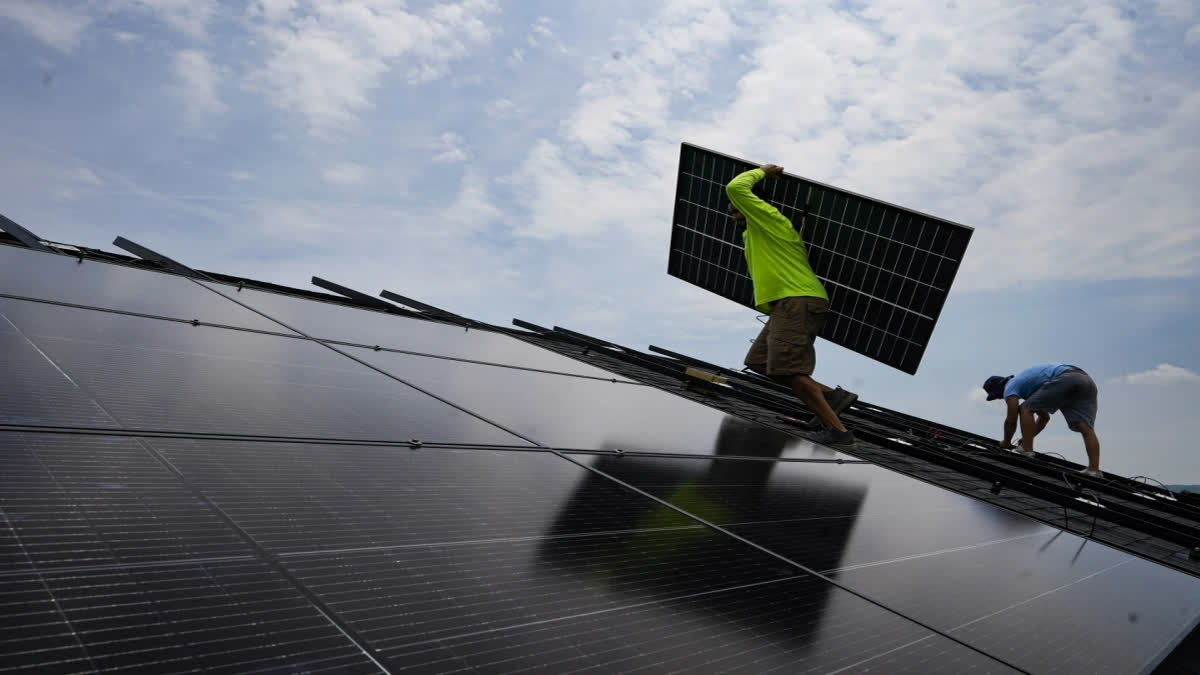United Nations: With the world far off track on its 2015 pledge to curb global warming, a new United Nations report central to upcoming climate negotiations details how quickly and deeply energy and financial systems must change to get back on a safer path.
The window of opportunity to secure a livable and sustainable future for all is rapidly closing, Friday's report warned. The globe has to cut its emissions of heat-trapping gases by 43% by 2030, compared to 2019 levels, and 60% by 2035, the report said. To get there, the report said, the phase-out of unabated fossil fuels is required, using a phrase international climate negotiators have shied away from before. It also said phasing out the internal combustion engine would be a huge help.
And the way money flows such as investments, subsidies, loans, grants and payments for people and places hurt by warming's extreme weather also has to change, the report recommended. It said countries need to stop USD 450 billion in annual subsidies for coal, oil and natural gas.
Halting and reversing deforestation and adopting better crop-growing practices are critical to fighting climate change, the report said. It noted that about 95% of deforestation is in the tropics, but global consumers drive the tree loss.
We must urgently disrupt business as usual and unite like never before to move from ambition to action and from rhetoric to real results, upcoming international climate negotiations president Sultan Al Jaber said in a statement.
The first of its kind report, called the global stocktake on climate-fighting efforts, put such an emphasis on change that it used variations of the word transform more than 50 times in 47 pages.
The report really puts a spotlight on that kind of transformation of systems that needs to take place, said David Waskow, international climate initiative director at the World Resources Institute. We're past the point of incremental type of change if we're going to take seriously what needs to be done.''
Former U.S. Vice President Al Gore said on social media, This latest report shows that we are failing, not because we don't know the answers but because we aren't doing our homework. This comes as leaders of the top 20 economies, responsible for 80% of the world's greenhouse gas emissions, meet in India. United Nations Secretary-General Antonio Guterres told them to act quickly on warming because the climate crisis is worsening dramatically.
In 2015, as part of the landmark Paris Agreement, the countries of the world agreed to try to limit warming to 1.5 degrees Celsius (2.7 degrees Fahrenheit) or at least 2 degrees Celsius (3.6 degrees Fahrenheit) since pre-industrial times. It's already warmed about 1.1 degrees (2 degrees Fahrenheit) since the mid-1800s.
Also read:What happens when things get too hot to handle?
Limiting warming to 1.5 degrees is another window of opportunity that is rapidly closing, the report said. Earlier this year, the World Meteorological Organization said there's a two-out-of-three chance that in the next five years, Earth will exceed that threshold for a year. The report feels like a final warning, said Climate Analytics CEO Bill Hare, a climate scientist. 'If you guys don't get your act together, we're going to cook.'
The world just baked through the hottest summer ever recorded, and ocean temperatures keep smashing records. The way the Paris agreement works is that every country makes its own carbon pollution pledges and efforts and every five years they are supposed to ratchet them up. Key is that between those five years, climate negotiators come up with what's like a midterm grade for the world's efforts and a roadmap for preventing more dangerous warming.
That's the global stocktake released Friday. After three years of work by scientists, government officials and others, the United Nations' climate agency came up with a technical report that is supposed to lead to something bigger this December when world leaders and climate negotiators convene in Dubai.
Negotiators plan to use this report and discussions later this year to figure out what nations and the world as a whole will do next to fight climate change.
Also read:Extreme heatwaves grips Southwest; posing challenges for Desert cities
This global stocktake report provides clear direction on how we can meet the expectations of the Paris agreement by taking decisive action in this critical decade, said Al Jaber, an oil executive. To keep 1.5 within reach we must act with ambition and urgency' to reduce emissions 43% by 2030.
Two years ago, climate negotiators battled over adopting language calling for an end or phase-out of unabated coal use where emissions are not captured and stored and instead opted for weaker phase down language. Then, last year, a proposal to phase out or down all fossil fuels was made, but never was put on the agenda or officially debated.
There's no question that the phase out' language is an important marker, said Waskow of the World Resources Institute. The report does highlight progress made on renewable energy and other efforts to combat warming. But the progress isn't enough, said Tom Evans, a senior policy advisor at the European think tank E3G. We're off track. We are nowhere near where we need to be.
"The takeaway from the report shouldn't just be that we're off track", Evans said. "The takeaway from this report needs to be: This is what we can do about this." (AP)
Also read:Delhi gets its first heat action plan; no schools in afternoon, curb on non-essential water use
